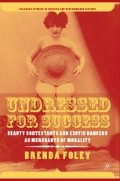Abstract
The careful construction of context is indispensable to the success of beauty contests and striptease alike, since both rely on the skillful theatrical employment of numerous visual cues to ensure the coherence of the performance event and to manipulate, and conform to, spectator perceptions and expectations. When the images presented by both forms are removed from their structured contextual positions, however, analysis of their discrete condition exposes the artifice in their constructions, irreparably damaging the illusion of the moment and often standing in blunt contradiction to the performances’ announced or implied aims. This point that was not lost on Miss Arizona 2002, who noted, “we would not have 40 million dollars in scholarship to give out if we didn’t have women in bikinis.” Similarly, the late comedian Foster Brooks, a Miss America judge in 1982, announced to the press, “If it’s not a beauty contest, then they should put bags over their heads.”3 Without a carefully constructed context (and in the absence of one or two categories of achievement), Lily Burana’s account of her experience in the Miss Topless Wyoming Contest might just as easily be taken for the final staged moments of the Miss America Pageant: “We’re all standing in a row, clapping for each other as winners are announced in the categories of Best Interview, Best Face, Best Breasts, Best Legs, Best Buns, and Best Pole Work.”4 This chapter will examine some of the means by which context and artifice are manipulated to produce performances that strike viewers as genuine, as authentically female in one or another of a small number of acceptable, predictable ways.
They told us to be false, and that’s all I’m doing.
“Some Girls,” Soho Weakly News1
Impersonal:
Though you be endowed with grace,
Though you be passing fair,
I cannot recall your face,
I was looking otherwhere.
Jeannette, in her “Songs for the G-String”2
Preview
Unable to display preview. Download preview PDF.
Copyright information
© 2005 Brenda Foley
About this chapter
Cite this chapter
Foley, B. (2005). Artifice and Authenticity: Parallels in Performance Approach. In: Undressed for Success. Palgrave Studies in Theatre and Performance History. Palgrave Macmillan, New York. https://doi.org/10.1007/978-1-137-04089-3_4
Download citation
DOI: https://doi.org/10.1007/978-1-137-04089-3_4
Publisher Name: Palgrave Macmillan, New York
Print ISBN: 978-1-349-73552-5
Online ISBN: 978-1-137-04089-3
eBook Packages: Palgrave History CollectionHistory (R0)

